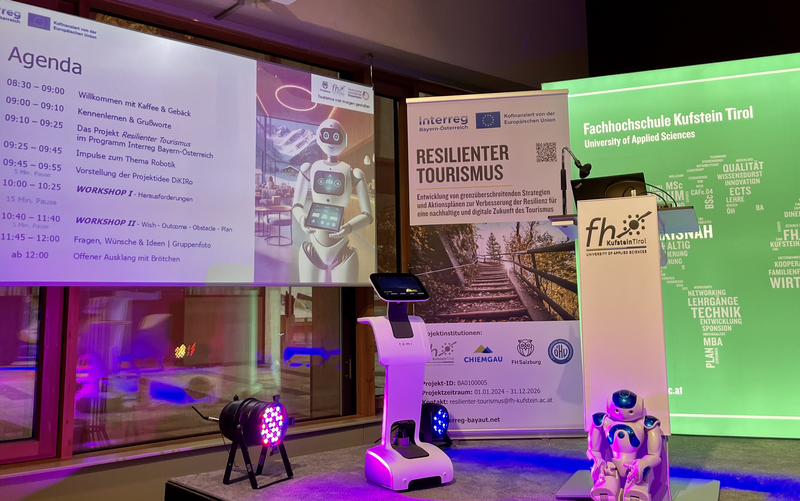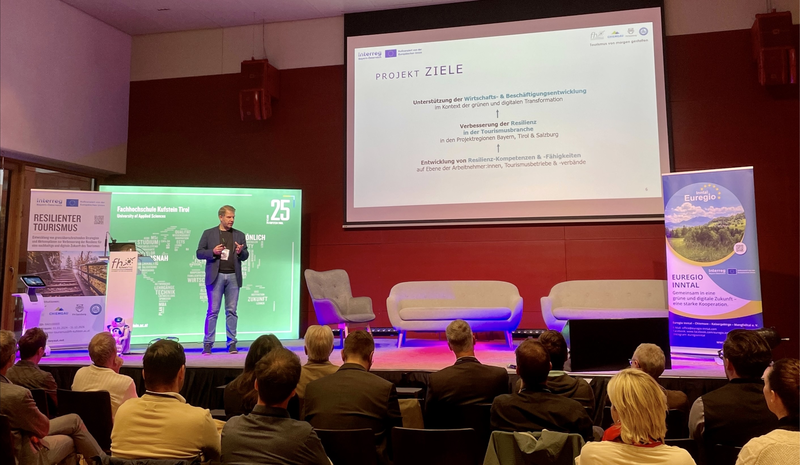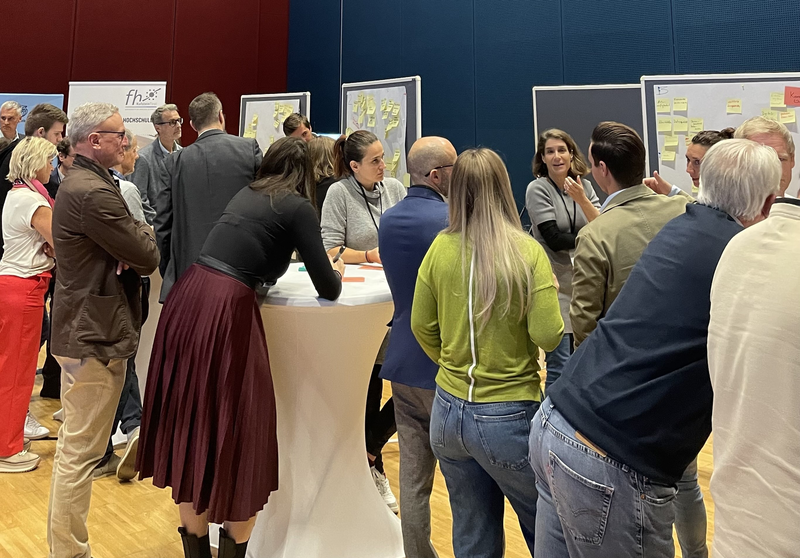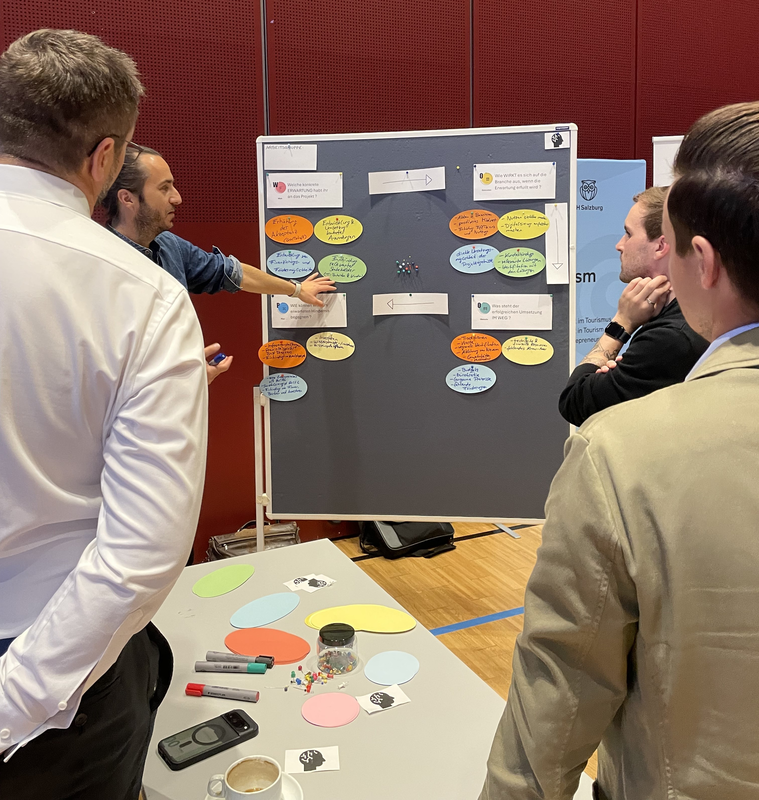Workshop on digitization and robotics in tourism
- 30.10.2024
- Research
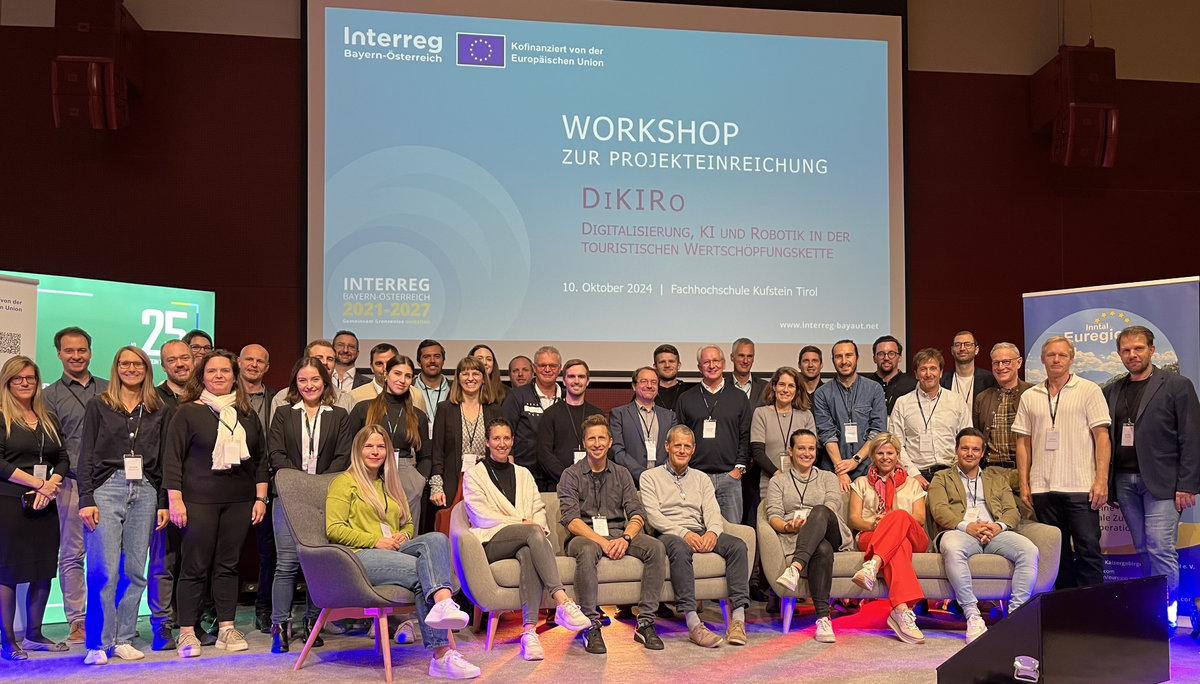
Participants of the workshop DiKIRo at the University of Applied Sciences Kufstein Tirol.
More than 40 stakeholders from the tourism, technology and research sectors attended the workshop organized by the FH Kufstein Tirol to submit the new Interreg research project DiKIRo.
At the beginning of October 2024, a workshop was held at the FH Kufstein Tirol to discuss the challenges and opportunities of digitalization and automation in tourism with practitioners from the tourism and technology industries. The background to this is the plan of the three higher education institutions, FH Salzburg, FH Kufstein Tirol and TH Rosenheim, to jointly submit a new, large-scale cross-border project on the topic of digitalization, AI and robotics in the tourism value chain to the funding agency Interreg Bayern-Österreich.
NEWS FROM THE CURRENT INTERREG PROJECT RESILIENT TOURISM
Since January 2024, the FH Kufstein Tirol has been the lead partner in the research project Resilient Tourism, which is being implemented together with the FH Salzburg, Chiemgau GmbH Tourismus and the ÖHV and is funded by Interreg Bayern-Österreich. The project aims to strengthen the crisis resilience of tourism destinations in Upper Bavaria, Salzburg and Tyrol. In recent months, three fireside chats have already been held with interesting lectures and lively exchanges on the topic of individual resilience, which were very well received by those working in the tourism industry. The next highlight will be the 1st Resilient Tourism Congress – Empowering People & Employees on November 14. In addition to inspiring keynotes, the results of the first major work package, namely the resilience index, will also be presented there. Next year, further exciting fireside chats and a congress on the topic of operational resilience await all interested parties. In addition, the project partners are starting to develop a resilience tool and the conceptualization of a free training course to become a resilience manager.
THE NEW PROJECT IDEA DIKIRO
At the same time, the Resilienter Tourismus project team is already working on another idea to support the tourism industry in the regions of Upper Bavaria, Tyrol and Salzburg in their technological progress. The project has the preliminary working title Digitization, AI and Robotics in the Tourism Value Chain, or DiKIRo for short. The core idea is to identify areas in the tourism industry that can be fully or partially automated using classic digitization solutions, advanced AI or robotics. Technical feasibility and efficiency, as well as ensuring service quality and social acceptance among guests, employees and entrepreneurs, are key elements that need to be researched and tested.
EXCITING INSPIRATION FROM ROBOTICS
Markus Ehrlenbach, laboratory manager at the University of Applied Sciences Kufstein Tirol, and Vincent Gschwendner, owner of Gschwendner Kulinarik GmbH, provided introductory impulses on the topic of robotics. Markus Ehrlenbach began by giving a helpful overview of the types of robots that already exist for different purposes, how they are operated, and how, for example, the company Zotter fascinates customers in its world of experience by using various robots. Vincent Gschwendner thrilled the audience with a self-made video of his service beverage robot, which is in use at his restaurant Hafenwirt in Seebruck during the summer season to save the waiters the long distances between the bar and the terrace. He gave an impressive account of how the idea was born out of necessity, when several seasonal workers dropped out at short notice a few years ago. Four robots are now in use at the Hafenwirt restaurant, to the great delight of both staff and guests.
SUPPORTIVE INPUT THROUGH WORKSHOPS
The highlight of the event were the two workshop units conducted by the University of Applied Sciences Kufstein Tirol with the aim of aligning the further development of the DiKIRo project design with the real needs of the industry. During silent brainstorming, the participants first wrote down their personal thoughts on the challenges they perceive in relation to the digitalization of the tourism value chain. The thoughts were then clustered together. The resulting overall picture ranges from challenging topics such as a lack of know-how and human resources to high financing costs and the issue of social acceptance. After the difficulties had been identified, a positive vision was developed using the (in a) target-oriented (way) WOOP method. To do this, the participants worked in groups on four questions regarding their expectations of the project, the positive effects if these expectations were met, the hurdles to successful implementation, and a plan for how the expected obstacles could be overcome. The detailed results are a great help for the project team around Prof. (FH) Dr. Mario Situm, FH Kufstein Tirol, in the conceptualization of the new project: “The results of the workshop show us where there is a need for action in practice and which topics we have to work on in the project. This enables us to develop work packages that cover the content that is really needed.” The fact that the event also received a very positive response from the 42 participants was evident not least from the lively discussions, which continued for a long time even after the official end.

